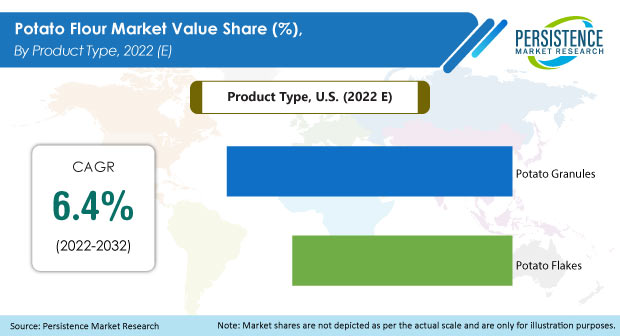U.S. Market Study on Potato Flour: Rising Clean Label Products Trend to Bode Well for Market Expansion
Industry: Food and Beverages
Published Date: August-2022
Format: PPT*, PDF, EXCEL
Delivery Timelines: Contact Sales
Number of Pages: 300
Report ID: PMRREP33148
The U.S. potato flour market is anticipated to expand at a high-value CAGR of 6.4% and increase from its current valuation of US$ 106.8 to reach US$ 198.1 Mn by the end of 2032.
More than 40% of the potato flour produced in the United States is used as an ingredient in the making of bakery products.
| Report Attribute | Details |
|---|---|
|
U.S. Potato Flour Market Size (2022E) |
US$ 106.8 Mn |
|
Projected Sales of Potato Flour (2032F) |
US$ 198.1 Mn |
|
U.S. Market Growth Rate (2022-2032) |
6.4% |
|
U.S. Consumption of Potato Flour (2022) |
55,296 Tons |
|
Market Share of Potato Granules (2022) |
56.5% |
Historically, from 2017 to 2021, the U.S. market for potato flour registered a compounded annual growth rate (CAGR) of 5.9%.
Demand for products offering several health benefits is witnessing an upward trend in the United States. Potato flour is a fine powder made from dehydrated potatoes, which is a good source of essential nutrients such as vitamin A & carbohydrates and contains a low level of glycemic index, which helps in lowering blood sugar levels and reduces the risk of heart disease.
Due to the various processing techniques, the market is bifurcated into potato flakes and potato granules. Flakes are fine crumbs and pieces, while granules exist in the form of powder.
This multi-purpose flour sees high demand from the food sector, which will majorly boost the prospects of the potato flour industry in the U.S. Consumption of potato flour in the U.S. is likely to surge as the vegan population grows and plant-based production increases across the country.
Potato flour has strong demand among U.S. consumers and has gained prominence in the retail/household industry due to its versatile nature, wherein, it’s primarily used as a thickener, binder, and flavor enhancer in soups and other processed foods.
Key factors that have fueled market growth in recent years have been increasing health awareness, growing preference for nourishing plant-based sources, rising standards of living, rapid urbanization, changing lifestyles, and growing disposable income of the population.
In the U.S., potato flour is expected to show significant demand growth and register a CAGR of 6.4% over the forecast period of 2022-2032.

“Bakery Sector Bringing Growth Opportunities for Potato Flour Manufacturers”
The baking industry plays an important role in the U.S. market and demand for various baked products among consumers is increasing at a rapid rate due to changing lifestyles and the rising trend of dining out. Potato flour is a versatile ingredient that bakery experts prominently use to produce several innovative products.
Potato flour, being a multi-purpose grain-free flour, has several functions, and its low-protein content makes it highly suitable for tender baking applications such as cakes, muffins, pie crusts, and some cookies. Flour, when incorporated into baking, provides a distinctive flavor and texture that makes it more useful in pancakes, quick bread, muffins, and banana bread. It has an excellent water-retention capacity that aids in producing moist yeast bread and rolls.
Also, many food creators have found that sweet potato flour added to bakery products extends their shelf life significantly. Longer shelf life not only ensures product usability for a longer period but also reduces the chances of processed product oxidation with the amount of antioxidants in them.
“Potato Flour - The Ideal Alternative to Wheat Flour”
Potato flour is a farinaceous food product made from whole peeled potatoes that is fine in texture. On other hand, wheat flour is a powder containing gluten made by grinding grains. Potato flour, being a gluten- and grain-free product, is gaining traction among consumers. Home bakers, food manufacturers, and culinary professionals across the U.S. prefer it as an ideal substitute for wheat flour.
Potato flour is mostly chosen over wheat flour due to its ability to lower the risk of celiac disease, which is an autoimmune disorder. Gluten present in wheat, barley, and rye flour may cause inflammation that has a negative impact on the small intestine’s lining, which causes digestion issues. Potato flour is low in protein and is very easy to digest due to the presence of resistant starch and helps in blood sugar management.
Furthermore, the trend of incorporating gluten-free diets among U.S. consumers is increasing due to growing awareness of the negative impact of gluten, which might cause serious health issues. Moreover, various pieces of evidence indicate that U.S. retail sales of gluten-free products continue to grow and consumers are preferring them more than ever.
As a result, potato flour is considered one of the best plant-based foods because it has an equivalent level of nutritional value, thereby driving its consumption.
“Consumers Opting for More Organic Food Products”
Organic food is considered healthy as it is grown naturally without the use of artificial chemicals such as pesticides and fertilizers. Moreover, consumer behaviors and purchasing habits have changed as they are highly health-conscious and prefer to buy products that do not contain synthetic additives. Similarly, in the U.S., the organic food market has accelerated rapidly and rising consumer preference for naturally-grown foods has opened up new market opportunities for food manufacturers.
Major U.S. manufacturers, suppliers, and distributors are introducing organic potato flour in their product lines, while some producers of conventional products have also introduced organic food to their portfolios. As a result, potato flour is expected to flood supermarkets, conventional stores, and direct-to-consumer markets. Furthermore, due to rising disposable income, consumers are ready to pay more for organic products, which are likely to propel the potato flour market across the U.S.
“Premium Price of Potato Flour Decelerating Market Growth”
Potato flour is a powder or set of granules that are prepared through dehydrating potatoes using state-of-the-art equipment, and the complete process - from growing the potatoes to producing the flour or flakes - is scrutinized by a quality assurance team.
The making of potato flour is a complex and longer process than the production of other types of flour. The drying process also involves more labor and equipment than the boiling process. High production costs involved in manufacturing potato flour make the final product more expensive, which may adversely affect market growth to some extent, with potato flour available at a higher price in the U.S. market as compared to other types of flour.
Major players with expertise emphasize on the whole process that requires a significant financial commitment and a group of specialists with in-depth knowledge of high-quality flour, raising the cost of production and acting as a market restraint.
Why are Potato Granules Most Widely Used in the U.S.?
Based on product type, the potato granules category holds the largest market share. However, potato flakes are anticipated to boost over sales because of increasing demand in the food industry.
The market value share of potato granules is 56.48% in 2022, which is projected to reach US$ 60.3 Mn by the end of the forecast period in the U.S. market.
Which End Use of Potato Flour Will Account for High Revenue Streams?
Based on end use, the potato flour market is segmented into the food industry, foodservice, and retail/household. The food industry holds a major value share in the U.S. market at 64.1% in 2022, with the segment currently valued at US$ 68.5 Mn.
Companies involved in the production and distribution of potato flour are focusing on offering clean label and non-GMO certified products in the U.S. marketplace. Manufacturers are emphasizing providing potato flour according to the benchmark set by various end-use industries.
Moreover, consumers nowadays make choices and buy products by reading the information and attributes present on the labels. Thus, major players are leveraging this opportunity and using it as a key strategy to drive their potato flour sales across the United States.
|
Attribute |
Details |
|---|---|
|
Forecast period |
2022-2032 |
|
Historical data available for |
2017-2021 |
|
Market analysis |
USD million for value |
|
Key market segments covered |
|
|
Key companies profiled |
|
|
Report coverage |
|
|
Customization & pricing |
Available upon request |
U.S. Potato Flour Market by Product Type:
U.S. Potato Flour Market by End Use:
U.S. Potato Flour Market by Distribution Channel:
To know more about delivery timeline for this report Contact Sales

The U.S. potato flour market is currently valued at US$ 106.8 Mn.
Increasing demand from the food industry, rising demand for natural food products that provide multiple health benefits, strong preference for gluten-free products, and increasing consumption of potato flour in retail/household are factors driving market expansion.
From 2017 to 2021, demand for potato flour in the U.S. increased at a CAGR of 5.9%.
Sales of potato flour in the U.S. are projected to increase at 6.4% CAGR and reach US$ 198.1 Mn by the end of 2032.
Bob’s Red Mill Natural Foods, Idaho Pacific Holdings, Edward & Sons Trading Co., Kipuka Mills, Authentic Foods, and King Arthur Baking Company are prominent potato flour producers in the U.S.